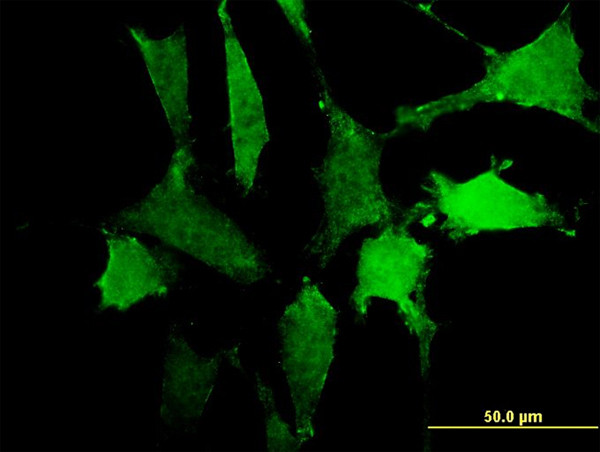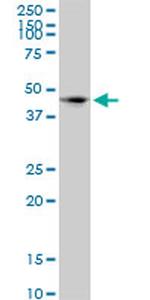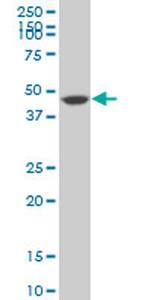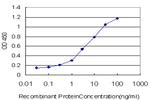Search Thermo Fisher Scientific
Product Details
H00140885-M10
Species Reactivity
Host/Isotype
Class
Type
Clone
Immunogen
Conjugate
Form
Concentration
Purification
Storage buffer
Contains
Storage conditions
Shipping conditions
Product Specific Information
Sequence of this protein is as follows: VAGEEELQVI QPDKSVSVAA GESAILHCTV TSLIPVGPIQ WFRGAGPARE LIYNQKEGHF PRVTTVSEST KRENMDFSIS ISNITPADAG TYYCVKFRKG SPDTEFKSGA GTELSVRAKP SAPVVSGPAA RATPQHTVSF TCESHGFSPR DITLKWFKNG NELSDFQTNV DPVGESVSYS IHSTAKVVLT REDVHSQVIC EVAHVTLQGD PLRGTANLSE TIRVPPTLEV TQQPVRAENQ VNVTCQVRKF YPQRLQLTWL ENGNVSRTET ASTVTENKDG TYNWMSWLLV NVSAHRDDVK LTCQVEHDGQ PAVSKSHDLK VSAHPKEQGS NTAAENTGSN ERNIYIVVGV VCTLLVALLM AALYLVRIRQ KKAQGSTSST RLHEPEKNAR EITQVQSLDT NDITYADLNL PKGKKPAPQA AEPNNHTEYA SIQTSPQPAS EDTLTYADLD MVHLNRTPKQ PAPKPEPSFS EYASVQVPRK
Target Information
SIRP alpha (CD172a, signal-regulatory protein alpha) is a receptor-type transmembrane glycoprotein expressed on cells of myeloid origin, including granulocytes, dendritic cells (DCs), macrophages, mast cells and hematopoietic stem cells. SIRP alpha acts as a substrate for several activated tyrosine kinases, including EGFR, PDGFR, src and insulin receptor and is involved in the negative regulation of receptor tyrosine kinase-coupled signaling pathways. The ligand binding of SIRP alpha to integrin-associated protein CD47 results in tyrosine kinase phosphorylation of immunoreceptor tyrosine-based inhibitory motifs (ITIMs) within the cytoplasmic region of SIRP alpha, which mediates the recruitment and activation of the tyrosine phosphatases SHP-1 and SHP-2. Ligation of SIRP alpha with CD47 has been demonstrated in several regulatory processes, including the inhibition of host cell phagocytosis by macrophages and the bi-directional activation of T cells and DCs. SIRP alpha has regulatory effects on cellular responses induced by serum, growth factors, insulin, oncogenes, growth hormones and cell adhesion, and plays a general role in different physiological and pathological processes. Cancer cells highly express CD47, which activates SIRP alpha and inhibits macrophage-mediated destruction of cancerous cell growth.
For Research Use Only. Not for use in diagnostic procedures. Not for resale without express authorization.
References (0)
Bioinformatics
Protein Aliases: Bit; Brain Ig-like molecule with tyrosine-based activation motifs; brain immunological-like with tyrosine-based motifs; brain-immunoglobulin-like molecule with tyrosine-based activation motifs; CD172 alpha; CD172 antigen-like family member A; CD172a; Inhibitory receptor SHPS-1; Macrophage fusion receptor; mSIRP-alpha1; MyD-1 antigen; p84; protein tyrosine phosphatase, non-receptor type substrate 1; SHP substrate 1; signal-regulatory protein alpha; Signal-regulatory protein alpha-1; Signal-regulatory protein alpha-2; Signal-regulatory protein alpha-3; Sirp-alpha-1; Sirp-alpha-2; Sirp-alpha-3; SIRPalpha; SIRPalpha2; tyrosine phosphatase SHP substrate 1; Tyrosine-protein phosphatase non-receptor type substrate 1
Gene Aliases: AI835480; BIT; CD172A; MFR; MYD-1; MYD1; P84; PTPNS1; SHP-1; SHPS-1; SHPS1; SIRP; SIRPA
UniProt ID: (Human) P78324, (Mouse) P97797
Entrez Gene ID: (Human) 140885, (Mouse) 19261

Performance Guarantee
If an Invitrogen™ antibody doesn't perform as described on our website or datasheet,we'll replace the product at no cost to you, or provide you with a credit for a future purchase.*
Learn more
We're here to help
Get expert recommendations for common problems or connect directly with an on staff expert for technical assistance related to applications, equipment and general product use.
Contact tech support




